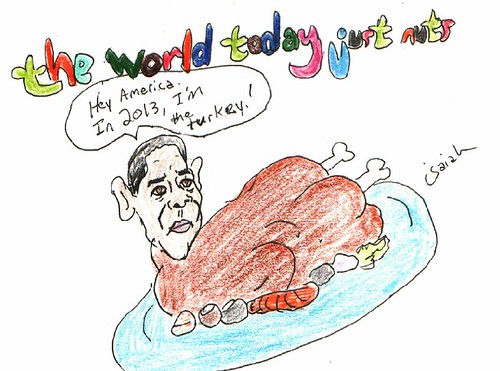
The theme Thursday was Barack's a turkey. Thursday morning, Isaiah's comic went up.
Thursday afternoon, Hillary Is 44's "Happy Thaxngiving! Remember ObamaCare Is A Turkey" went up:
It’s time to put the ax back in Thanksgiving. The news that Obama and ObamaCare totalitarians issued orders to the troops to pollute the Thanksgiving table with lying propaganda for ObamaCare puts us in ax wielding mode. Beware ObamaCare turkeys! If you soil our Thankgiving feast with Obama fueled propaganda it won’t just be a 2×4 smack across the head that silences you.
Thanksgiving is a wonderful holiday in which we should look at even near empty glasses as sources of delight and gratitude. You’re breathing? Be thankful. You didn’t vote for Obama? You’re a special person deserving of many more blessings. You voted for Obama? You’re not very bright but be thankful that there is still time to learn and make it up to the country you have so wounded with your stupidity.
You’re Mike Tyson and made a lot of bad choices and horrid acts throughout your life? Rejoice Mike, you are smarter and braver than many think you are so there is hope for you.
Poor Barack. Once he was flying high. Now, no matter how hard he flaps his wings, he can't get off the ground.
In fact, he's having more problems these days than his awful ObamaCare.
He's declared war on the whistle-blowers, spied on the press, trying to toss poor James Risen behind bars because Risen won't reveal a source, he's overseen illegal spying on American citizens and then came the last straw, his Hurricane Katrina, the lie that brought him down: ObamaCare.
We were no longer willing, as a country, to indulge him by pretending he was incredible or even just competent.
He's a crook plain and simple.
On the spying . . .
"Privacy and the Public Interest" (James B. Rule, Dissent):
Decades ago, I resolved to read every article and book on privacy that appeared in the mainstream media. I didn’t succeed, but at the time the plan was not crazy. Today anyone who attempted it would quickly run aground.
In this millennium the steady onslaught of innovation in modes of creating, analyzing and exploiting personal information is the new normal. The changes come in waves. The eighties gave us the Internet, with its voracious capacities to elicit from and absorb the data of its users; the nineties opened the way to mobile telephoning and web marketing. And since 2000, social media have spawned yet another set of seductive inducements for generating information on one’s self—along with new industries for appropriating and exploiting such data. It would be absurd to imagine that these waves of innovation in the social role of personal information have exhausted themselves.
The still-unfolding revelations of NSA surveillance over virtually all of Americans’ telecommunications have of course given new urgency to these concerns. But I believe that one reason why these disclosures have reverberated so widely is the widespread realization that our phone calls, text messages and e-mails represent just one among countless forms of personally-identifiable data that are vulnerable to such tracking. People sense—and properly so—that there’s no telling what further forms of personal information state and corporate organizations will next find ways to tap into. The lame protests of top officials that government is “only” tracking connection data (who contacts whom, how often, and for how long) flout the limits of public credulity. In fact, we are witnessing a quantum step forward in the kinds of things governments can know about the governed. We are right to wonder what else the watchers will next be shown to be tracking—and what new opportunities for such monitoring the coming years will offer.
As one might expect, commentaries on the fate of privacy—that amorphous notion—in the face of these changes have grown apace. Nearly all the authors express something between concern and anguish over privacy values in a world where more and more interested parties have a role in monitoring and sharing more and more details of everyone’s lives. The first thing to note about this outpouring of concern is that hardly anyone is prepared to declare himself or herself against privacy or even indifferent to its fate. The second thing is how rare are proposals for defensible, robust measures to redress the balance between privacy interests and the forces countervailing against them. Still scarcer, for similar reasons, are systematic arguments as to where in principal to draw the line between what information (or images, or realms of experience) must be defended as private—and where the public interest warrants access even to matters that the parties would prefer to keep to themselves.
That's the opening of the book review. Make a point to read it in full. He's covering a great deal in that review.
I hope everyone had a great Thanksgiving. Thank you to C.I. for filling in for me Wednesday night. She did a great job. In fact:, she filled in for three others besides me:
"The NSA (C.I.)"
"Thankful? (C.I.)"
"The discourteous online world (C.I.)"
"On Alec Baldwin, Barbra Steisand and others (C.I.)"
So thank you to C.I. for that.
We had a last minute work glitch. I could assign it -- and ruin someone else's holiday -- or I could fix it myself. I decided to do the latter. So I sent the kids out to Atlanta on the weekend (my oldest is mature enough to be responsible for his brother and sister) and stayed here fixing the problem on Monday, running it over and over on Tuesday and then Wednesday doing the presentation before splitting for Atlanta myself.
I have had so much fun I'm really not ready to go back.
But I will.
I hope everyone else had a great Thanksgiving.
"Iraq snapshot" (The Common Ills):
It's Friday, protests have been taking place in Iraq since December 21st. Iraqi Spring MC notes protests took place in Falluja (above), Samarra, Jalawla, Tikrit, Baquba, among others.
Earlier this week, NINA reported, "Prime Minister Nuri al-Maliki said that there will be a response to all legitimate demands of people of Anbar province which were been presented by the province delegation and its provincial council during the recent meeting with him." More empty words from Nouri.
Monday, Nickolav Mladenov, the UN Secretary-General's Special Representative to Iraq and head of the United Nations Assistance Mission in Iraq, addressed the United Nations Security Council.
Nickolay Mladenov: Protests continued in Anbar, Nineveh, Salah al-Din, Kirkuk and Diayala governorates in the form of unified Friday prayers. Compared to the past reporting period, the protests assumed a lower profile, owning in part to increased attention to the protesters' demands by newly elected local administrations. Indeed, the Anbar Governorate Council elected Sabah Karhout, a member of the Arab Iraqiya party, as its chair, and Ahmed Khalif al-Dulaimi, a member of the Muttahidoun party, as Governor. In Ninewa, the Governorate Council re-elected Atheel al-Nujaifi, a known supporter of the protestors and brother of the Speake of the Council of Representatives [Osama al-Nujaifi], as Governor. On 5 October dialogue between the Government and the protestors resumed following a meeting between the Prime Minister [Nouri al-Maliki] and the Governor of Anbar, who was nominated by the demonstrators to represent their interests. While the meeting was described as positive and fruitful by the Prime Minister's office, no progress has been announced to date in addressing the demonstrators' demands.
Nouri's empty words accomplish nothing. It's 22 days away from one year of protests. Nouri's refused to address the concerns of the protesters. Despite repeatedly claiming he would. (There was a minor for-show release of a limited number of innocents people held behind bars without charges.)
Speaking to Patrick Cockburn (Independent) this week, cleric and movement leader Moqtada al-Sadr shared his thoughts on Nouri and the protests:
Mr Sadr is particularly critical of the government’s handling of the Sunni minority, which lost power in 2003, implying they had been marginalised and their demands ignored. He thinks that the Iraqi government lost its chance to conciliate Sunni protesters in Iraq who started demonstrating last December, asking for greater civil rights and an end to persecution.
“My personal opinion is that it is too late now to address these [Sunni] demands when the government, which is seen as a Shia government by the demonstrators, failed to meet their demands,” he said. Asked how ordinary Shia, who make up the great majority of the thousand people a month being killed by al-Qa’ida bombs, should react, Mr Sadr said: “They should understand that they are not being attacked by Sunnis. They are being attacked by extremists, they are being attacked by external powers.”
It's amazing that, having passed the 11th month mark, the protests have received so very little attention from the western media.
Via Iraqi Spring MC, here's more of what the western press ignored today.
NINA quotes Anbar's Sheikh Mohammed Fayyad stating, "The citizens participated in the prayers that held in the courtyard northern Ramadi and eastern Fallujah cities , stressing that the goal of this trickle is to send one again a message to the governing in Baghdad that our demonstrations are peaceful and backed by citizens deep conviction."
Sameer N. Yacoub (AP) reports 18 corpses, bullets in head, were found dumped in the town of Mishada. BBC News adds the 18 were abducted from their homes hours prior to being dumped and that the kidnappers "were wearing police uniforms, according to eyewitnesses." AFP offers, "The victims, all male, were taken on early Friday by men wearing military uniforms and driving around six SUVs, which looked like army vehicles. The victims' families were told that they were suspects in an official investigation and were being taken away for questioning, witnessed told AFP."
AFP and Al Jazeera rush to name al Qaeada.
It must be nice to be a crook in Iraq, the press always willing to cover for you, always willing to lie.
They lied in 2006 as well. Repeatedly.
This is why the ethnic cleansing lasted two year -- media felt their job was to protect Nouri and his goons, even if Nouri and his goons were the ones doing the killings.
One of the few to tell the truth was the human rights organization Human Rights Watch. October 29, 2006 they issued a statement which opened:
The Iraqi government must move quickly to prosecute all Ministry of Interior personnel responsible for “death squad” killings in Baghdad and elsewhere, Human Rights Watch said today.
“Evidence suggests that Iraqi security forces are involved in these horrific crimes, and thus far the government has not held them accountable,” said Sarah Leah Whitson, director of Human Rights Watch’s Middle East division. “The Iraqi government must stop giving protection to security forces responsible for abduction, torture and murder.”
Every month, hundreds of people are abducted, tortured and killed by what many believe are death squads that include security forces. To terrorize the population, the killers often dump the mutilated corpses in public areas.
Human Rights Watch welcomed the recent suspension from duties of the 8th Iraqi Police Unit pending an investigation into their complicity in abductions and killings. The US military has claimed that the unit was responsible for the October 1 kidnapping of 26 Sunni food factory workers in southwest Baghdad, 10 of whom were later found dead. The news agency Inter Press Service reported that the unit used Ministry of Interior vehicles and, according to witnesses, some wore black “death squad” uniforms.
AFP and Al Jazeera cite police for the 'proof' that the culprits are al Qaeda.
Neither damn outlet notes the reality that the police and the military -- all the security forces Nouri controls -- were active killing Iraqis as part of the ethnic cleansing from 2006 to 2007. It's the same way they covered up the Ministry of Interior targeting and killing men suspected of being gay only a little while ago.
Apparently truth telling and 'reporting' don't go hand in hand.
Today, 18 people are pulled from their homes by people wearing security uniforms and driving security vehicles.
AFP and Al Jazeera rush to tell you that it's al Qaeda.
They have no proof. They'll lie and whore -- because that's what the press does -- and insist that they're just including details to flesh out the 'reporting.'
Those aren't details, those are accusations. A detail? That would be noting the long history Nouri's forces have for conducting 'extra-judicial' killings.
Borzou Daragahi (Los Angeles Times) reported in October 2006 on the response from Jawad Bolani to accusations that police forces were carrying out "sectarian death squad killings." Daragahi noted:
Few sectarian gang members who have been arrested were employees of the ministry, Bolani said. Often they worked for a separate Iraqi security force that guards government buildings, or are security guards at other ministries or for politicians. Some arrested have been linked to the Iraqi National Intelligence Service, he said.
But AFP and Al Jazeera can't be bothered noting any of that.
Why?
Because the Ministry of the Interior has a sterling reputation today and is run by . ..
Oh, wait. It's reputation is worse today than it was back then. In addition, it has no minister heading it. Nouri never nominated anyone to. Nouri is the one overseeing it.
So little suck-ass 'reporters'? They hump Nouri's leg while whimpering and pretending that passes for reporting.
We know it doesn't.
We all know it doesn't.
What it does do is demonstrate how biased AFP and Al Jazeera are, how they suck up to power and turn a blind eye to the suffering.
But we already knew that, right? Al Jazeera and AFP didn't say one damn word about today's massive protests.
They ignore so very much. The ignore that Nouri al-Maliki is supporting Shi'ite militias. Tim Arango (New York Times) broke that story at the end of September:
In supporting Asaib al-Haq, Mr. Maliki has apparently made the risky
calculation that by backing some Shiite militias, even in secret, he can
maintain control over the country’s restive Shiite population and,
ultimately, retain power after the next national elections, which are
scheduled for next year. Militiamen and residents of Shiite areas say
members of Asaib al-Haq are given government badges and weapons and
allowed freedom of movement by the security forces.
Asaib al-Haq have badges and weapons supplied by Nouri.
A Shi'ite death squad.
Unnamed police 'sources'? AFP and Al Jazeera run with it ignoring the fact that such sources are hardly unbiased. While they include those sources, they ignore many others. Here's one example.
For the record, a member of Parliament? Official source. But not in Nouri's tent. So AFP and Al Jazeera feign ignorance.
They are pretending, right?
There's no way that two news outlets could be that ignorant, is there?
Those weren't the only corpses popping up today. NINA reports 3 female corpses were discovered in Baghdad with signs of torture. NINA notes 7 corpses were discovered in Tikrit, Iraqi males who were working in Tikrit on the construction of Tikrit Stadium -- all seven were decapitated. The heads were found elsewhere in the city -- 5 of which has been "filled with explosives."
And those weren't the only deaths. NINA reports another mayor has been killed, this time it was Mayor Sa'ad Ali Sheet by a Hamam Aleel sticky bombing. Also? A Baghdad livestock market bombing which claimed 1 life and left seven people injured, a Baghdad sticky bombing claimed the life of 1 Ministry of Environment employee, a Mousl rocket attack claimed the lives of 2 Iraqi soldiers, a Kirkuk bombing claimed the life of 1 Iraqi military officer and left three soldiers injured, a Sadiya home invasion left 2 people dead, a southwest Baghdad bombing near a football field left 5 people dead and nine more injured, 2 Baghdad home invasions left 6 women and 1 man dead, and, dropping back to late Thursday, "Unidentified gunment killed six people, including an officer, and his wife, after setting an ambush south of Tirkit last night"
Staying with violence, Monday, Iraq's Journalistic Freedoms Observatory has issued a release on Alaa Idwar (pictured below).
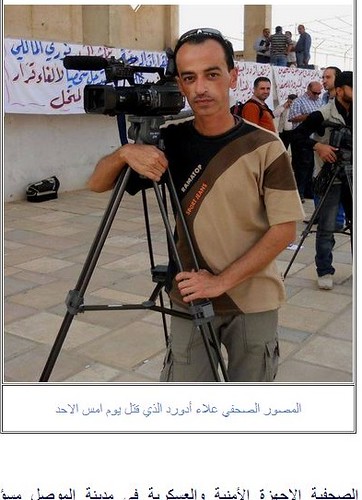
The JFO noted that they hold military and security forces responsible for not providing security -- not providing security as journalists have faced increasing threats and violence in Mosul for the last two months. They explained that armed forces -- who do not provide their identities -- have also prevented journalists from doing their jobs, interfering with the reporters efforts to report what is taking place. They called for the federal government to conduct an investigation and to do so quickly.
Of Alaa Idhar's murder, they noted his death follows the murder of other journalists in Mosul. He was shot three times -- once in the head, once in the stomach and once in the chest. He wasn't far from his home when the attack took place. Alaa was 41-years-old and had begun his TV journalism career in 1999. In later years, he added photography and frequently free lanced including for Al Jazeera. The JFO noted that security forces found a "liquidation list" containing forty-four names, all of them journalists.
Today Human Rights Watch issued a staement which included:
Four journalists have been assassinated in Mosul, the capital of Iraq’s Ninewa Province, since early October 2013. Iraqisecurity officials have said they were investigating the killings, the most recent on November 24, but have not arrested or charged anyone in connection with the attacks.
At the same time, Iraqi prosecutors have stepped up criminal prosecutions of journalists for defamation and have increased other harassment of journalists. Three journalists told Human Rights Watch in November that security forces arrested them and confiscated their equipment after they covered politically sensitive topics, such as poor security, corruption, and the government’s inadequate response to the needs of people affected by flooding. Another journalist told Human Rights Watch that police arrested him on charges of defamation, a crime in Iraq’s penal code, for an article accusing officials of corruption.
“Journalists in Iraq face a double threat, from armed gangs gunning them down and prosecutors charging them, all because of what they write,” said Sarah Leah Whitson, Middle East director at Human Rights Watch. “The recent spate of assassinations of journalists has had a chilling effect on journalists, who risk being prosecuted by the very authorities that are supposed to protect them.”
Assassinations of Journalists
The killings in Mosul have made October and November the deadliest two-month period this year for journalists. Iraqi authorities have released no information about the results of any pending investigations into the killings, nor announced any arrests. The killings follow years of targeted violence against journalists in Iraq. Since the start of protests in Iraq in February 2011 over widespread corruption and lack of services, journalists have faced escalating attacks and threats, including from members of the government’s security forces. According to the Baghdad-based Journalistic Freedoms Observatory, 48 journalists in Mosul have been killed in violence since 2003.
In the latest killing, on November 24 unidentified assailants using automatic weapons shot and killed Alaa Edward Butros, a Christian journalist for al-Rashid television news service, as he sat in a coffee shop in the al-Majmua al-Thaqafeyya area north of Mosul. Gunmen shot and killed three other journalists in Mosul in October. Gunmen also killed two spokespersons for the Ninewa governor, Atheel Nujaifi, one in July and the other in October. Both had previously worked as journalists.
The al-Mada Press news agency, citing a source in the Ninewa police department, reported that security forces had “opened an investigation to find out more details about the assassination and who did it.” So far neither security forces nor the media have provided a reason for the killing. Christians in Mosul are frequently the target of attacks by armed insurgent groups like al-Qaeda.
Ninewa security forces made similar statements after the assassinations of the three other journalists in October, based on Mosul residents’ accounts to Human Rights Watch and local news reports. On October 5, gunmen shot Mohammed Karim al-Badrani, a television reporter working with al-Sharqiyya news service, and his cameraman, Mohammed al-Ghanem, in Mosul’s central al-Sarjakhaneh market when they were reporting on the neighborhood’s preparations for an upcoming religious holiday.
On October 24, gunmen using a silencer shot Bashar Abdulqader Najm al-Nouaymi, a cameraman working with al-Mosuliya news agency, in Mosul’s Nabi Shayth neighborhood.
On October 8, gunmen killed Saad Zaghloul, a spokesman for the Ninewa governor, in front of his home in Mosul’s al-Qadissiya neighborhood. In July, gunmen killed Nujaifi’s spokesman at the time, Qahtan Sami, then laid his corpse on the street while army officers looked on, accordingto a local news report.
Nujaifi told local media that local security forces know the names of members of “a group that specializes in assassinations,” but that he believes the forces have deliberately not taken any action to investigate or prevent the assassinations. A local journalist told Human Rights Watch that according to information a government source provided him, security forces have a list of 44 journalists that armed groups in the area have targeted for assassinations.
From the flowing of blood to the flowing of oil . . .
As long expected, ExxonMobil unloaded a dingo dog with fleas yesterday. Global Times reported, "American energy company Exxon Mobil sold part of its controversial stake Thursday in a massive Iraqi oilfield to PetroChina and Indonesia's Pertamina amid a long-running row with Iraq's central government. The sale of the stake in the West Qurna-1 field in south Iraq, one of the country's largest, marks a key step toward resolving the dispute with the central government over Exxon's contracts with the autonomous Kurdish region." When ExxonMobil signed a deal with the KRG, Nouri and his flunkies stamped their feet in public, then Nouri said that the US government had said they'd stop the deal, then spokesperson for the US State Dept Victoria Nuland had to note the obvious: the US government cannot force an oil company to do anything. Iraq has a history of state-owned oil companies. That's not the western model -- or the model the US government has repeatedly attempted to impose on Iraq since invading in 2003. Nouri didn't grasp that reality.
Once he did, he began insisting that ExxonMobil couldn't have the KRG deal and the West Qurna deal.
Nouri's an idiot. The West Qurna field is seen as a dingo dog with flease.
It was part of an embarrassing auction that Nouri's flunkies held and then re-held when the first one did so poorly.
Multi-national oil corporations aren't thrilled with the deals themselves that Baghdad's offering nor are they impressed with the so-so quality of the fields being offered.
By contrast, they feel the KRG provides better deals and has richer fields.
The illegal war has brought nothing but misery to Iraq. And yet US outlets don't feel compelled to cover what's taking place. They certainly don't feel remorse over selling the illegal war. Ali Mamouri (Al-Monitor) reports:
Iraqi Justice Minister Hassan al-Shammari announced Oct. 23 that he had prepared a Sharia-based personal-status law and submitted it to the cabinet for approval and referral to the Council of Representatives for passage. Should the law be approved, Iraqi municipalities would be required to apply penalties that violate human rights, such as mutilation and stoning, among others.
Attempts to impose Sharia in Iraq will likely lead to deeper sectarian divisions in the society, as religious views differ from one sect to another. Accordingly, there have been calls in some Sunni quarters to separate themselves from the Shiites and establish a Sunni state in their areas, in part because, they allege, the Shiites are moving toward the declaration of a Shiite state.
In the week where a teacher slapped a young girl for not wearing a veil at a public school, Abbas Sarhan (Niqash) reports some good news for Iraqi women:
Only a few years ago a woman driving on the
streets of Karbala was an unusual sight, one that some considered
indecent and odd. But this has changed a lot, with more women driving
and more locals considering it acceptable. And despite the city’s
conservative ways, local authorities are now sending their female staff
to driver education courses.
Local woman Ruqaya is proud that she was one of the first
females, if not the first, to drive a car in the conservative Iraqi city
of Karbala. She’s a school teacher and she was taking taxis to work
every day. “This was costing almost one quarter of my salary,” she
explained to NIQASH. “So I decided to buy a car. It was an old Daewoo
and I bought it for US$3,000. In 2009, I sold it and bought a sportier
model, a Kia.”
That was in 2005. “It was strange to see a woman driving a
car here,” she continues. “People often looked surprised or outraged
when they saw it. And there were men who would make fun of female
drivers and who made jokes about them.”
Once when her car broke down, Ruqaya had to leave it next
to a petrol station and she was jeered at by those who saw her
predicament as she left the car.
Karbala didn’t have any actual laws forbidding women from
driving and, unlike in some Gulf States, there has never been a fatwa,
or religious edict, issued that forbids women from driving. But in
Karbala, which is a seat of religious learning and also the home to some
of the most important sites in Shiite Islam, it was expected that
citizens would abide by the “rules of decency” and avoid any “forbidden
acts”. For many, this meant that women should not be behind the wheel of
a car.
However this has changed. “On the whole I think the people
of Karbala are civilized in the way they deal with women drivers,”
Ruqaya tells NIQASH. “And today there are dozens of women driving in the
city. Some of them even drive to other provinces.”
Monday, UNAMI issued the following:
Baghdad, 25 November 2013 – On International Day for the
Elimination of Violence Against Women (EVAW) today, the Special
Representative of the United Nations Secretary-General for Iraq (SRSG),
Mr. Nickolay Mladenov, used the opportunity to appeal to Iraqi leaders
to “take concrete steps to enact and enforce laws which prevent and
respond to gender-based violence (GBV), including holding perpetrators
accountable, and to create a framework for better outcomes for women and
communities.”
Acknowledging that a National Strategy on Combating Violence against
Women for 2013-2017 had been endorsed in March 2013 by the Council of
Ministers, the UN Envoy deplored that “violence still intersects with
nearly every facet of women’s lives, including at home, at school, in
the workplace and in society,” and called for a fundamental change in
mindsets that have been allowing violence to continue.
“Violence against women is a human rights violation. The scale and true nature of it is often hidden,” said Ms. Frances Guy, Representative of UN Women for Iraq. She highlighted the need for continuing action to eliminate violence against women, and for creating the appropriate framework that will enable women to enjoy physical safety as well as economic security. “It is crucial that all Iraqis support this important goal,” she stressed.
Every year, 25 November and the ensuing 16 Days of Activism against Gender Violence which follow – ending on 10 December, Human Rights Day – are commemorated around the world, providing individuals and groups a chance to mobilize and call attention to the urgent need to end violence against women and girls.
“Violence against women is a human rights violation. The scale and true nature of it is often hidden,” said Ms. Frances Guy, Representative of UN Women for Iraq. She highlighted the need for continuing action to eliminate violence against women, and for creating the appropriate framework that will enable women to enjoy physical safety as well as economic security. “It is crucial that all Iraqis support this important goal,” she stressed.
Every year, 25 November and the ensuing 16 Days of Activism against Gender Violence which follow – ending on 10 December, Human Rights Day – are commemorated around the world, providing individuals and groups a chance to mobilize and call attention to the urgent need to end violence against women and girls.
iraq
iraqi spring mc
national iraqi news agency
the los angeles times
borzou daragahi
the new york times
tim arrango
the independent
patrick cockburn
global times
niqash
abbas sarhan
global times
al-monitor
ali mamouri
 اعلام الربيع العراقي
اعلام الربيع العراقي
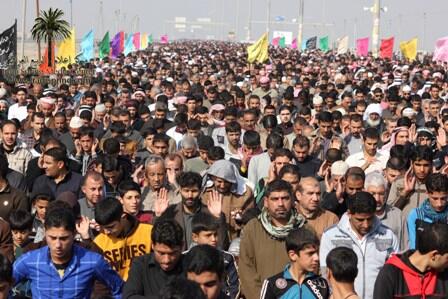
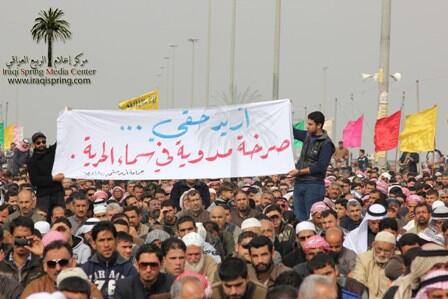
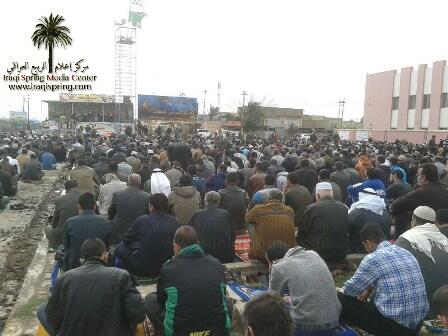
 Aymenn J Al-Tamimi
Aymenn J Al-Tamimi
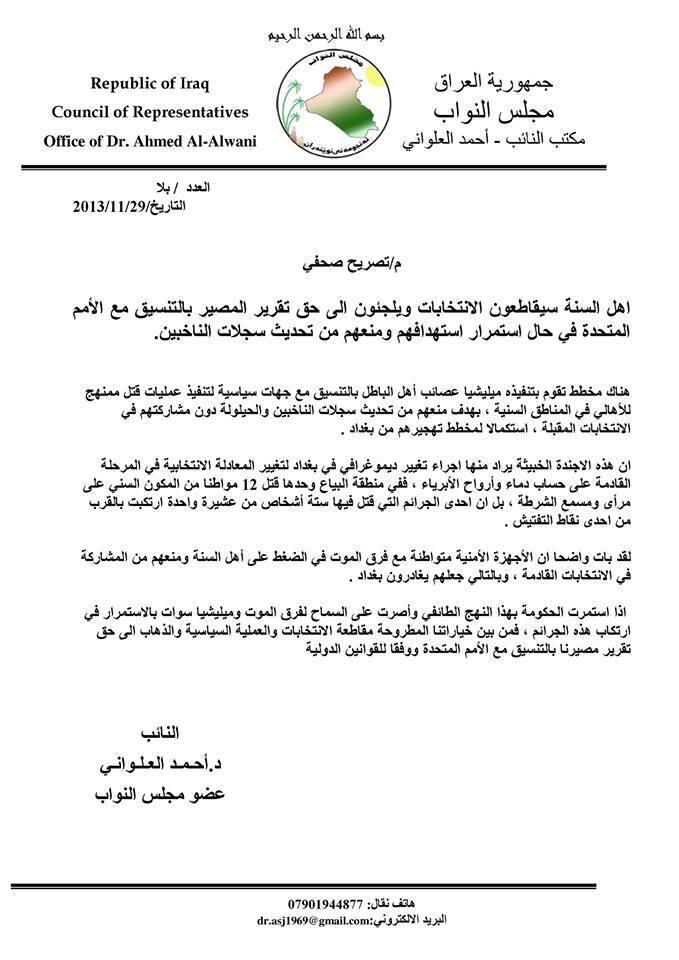
 WatchingaBuzz
WatchingaBuzz